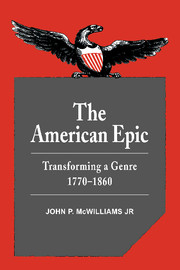2 - Freedom's Heroes
Published online by Cambridge University Press: 22 March 2010
Summary
The epic poem has always been, as Milton knew, “of highest hope and hardest attempting,” but creating the American epic posed problems of adaptation that were beyond promise of solution. As long as the word “epic” connoted “long, heroic narrative poem,” new wine would almost surely be poured into old skins. Convinced that the future of a Christian agrarian republic was the higher argument, American poets were drawn toward static prophecies of Utopia, while basing their slim narratives upon epic models that had exalted martial heroism. The Rights of Man were somehow to be affirmed through such essentially elitist conventions as the councils and single combats of chieftains. Neither of the approved meters was appropriate. The closed couplet, admirably suited to antithesis and irony, was now to serve as the medium for extended panegyric. The sublimity of Miltonic blank verse was to be applied to wholly human and earthly actions without incongruity or bombast. Although epic tradition encouraged the exalting of individuals, American readers were to accept the premise that the hero is all of us, in potential if not in present fact.
While recognizing the failings of American epic poems, it is now time to look beneath them, to attend more closely to the vision of New World culture these poems contain, and to consider carefully the process by which these poems were brought to their completion. Ridiculing without reading the poems of Dwight, Barlow, and “Pop” Emmons has long been a convention in itself, a way of disguising a nationalist literary inferiority complex by disassociating ourselves (as presumably perceptive modernists) from all those failed national poems.
- Type
- Chapter
- Information
- The American EpicTransforming a Genre, 1770–1860, pp. 42 - 66Publisher: Cambridge University PressPrint publication year: 1989

